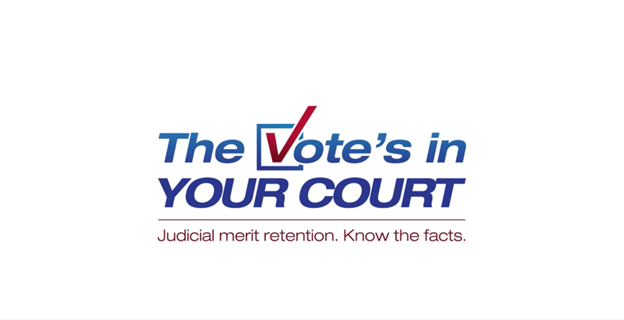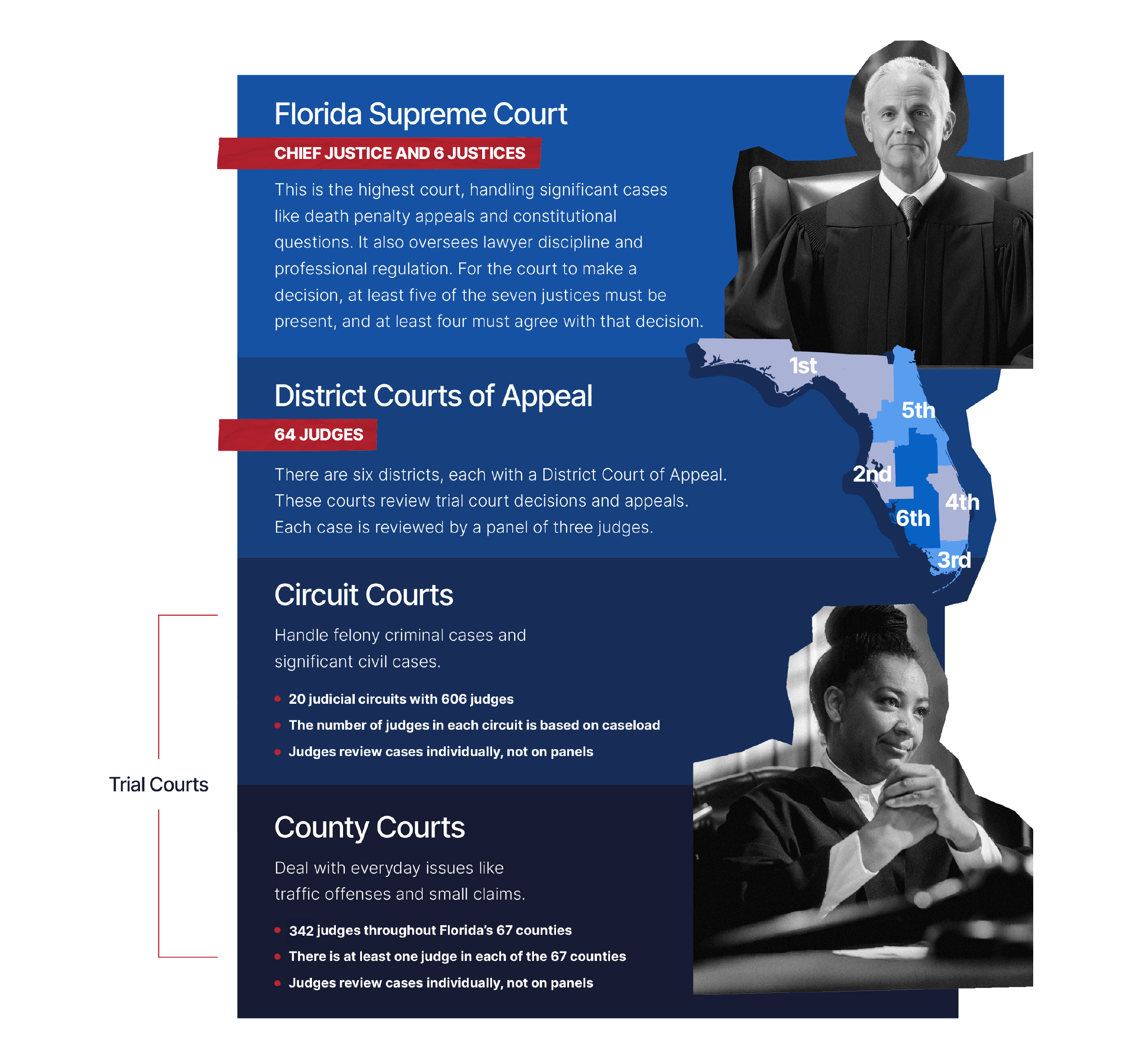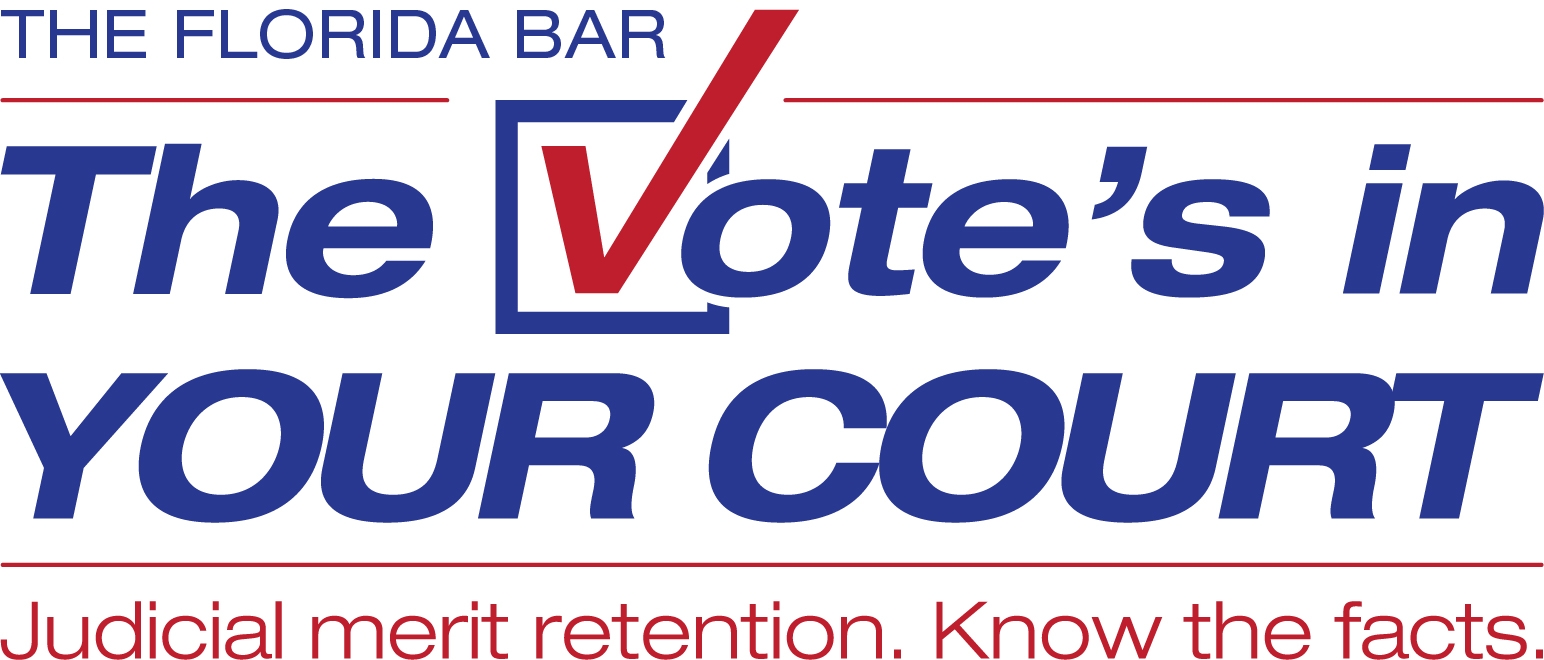At the Polls, the Vote’s in Your Court
Making Informed Decisions about Florida Judicial Elections and Merit Retention

Your Ballot Matters:
The Importance of Voting for Judges
Tempted to skip voting the judges on the ballot on election day? Only 47% of Florida voters feel confident about judicial elections and the merit retention process. The Vote’s in Your Court provides educational tools and resources to help you make informed decisions about judicial candidates.
In Florida, voters elect or retain judges, so deciding who holds these essential positions is up to you. Judicial decisions impact many aspects of life, from interpreting laws and protecting rights to resolving disputes and setting precedents. Your vote helps protect our legal system's integrity and effectiveness, ensuring the judiciary reflects community values.
Key Election Dates and Deadlines
Primary Election 2024
- Deadline to request mail-in ballot: August 8, 2024
- Early voting period: August 10 – 17, 2024
- Election Day: August 20, 2024
General Election 2024
- Deadline to register to vote: October 7, 2024
- Deadline to request mail-in ballot: October 24, 2024
- Early voting period: October 26 – November 2, 2024
- Election Day: November 5, 2024
The Role of Florida Judges
The Florida judiciary interprets and applies laws to ensure justice. Judges play a critical role by interpreting and applying the law, overseeing fair and impartial trials, and protecting citizens’ rights.
Types of Cases Handled
Judges make critical decisions every day on a wide range of issues, including:
Traffic
Small Claims
Landlord-Tenant
Personal Injury
Criminal
Death Penalty
Guardianship
Types of Judges
There are several types of judges within the court system that have different responsibilities. In Florida, both county court and circuit court judges are trial judges and preside over trials and hearings.
COUNTY JUDGE
Hear criminal misdemeanors and civil cases in which the amount in dispute is $50,000 or less.
CIRCUIT JUDGE
Hear criminal felonies, domestic relations, juvenile matters, probate issues, and civil cases in which the disputed amount is greater than $50,000.
APPELLATE COURT JUDGES
Judges on the six District Courts of Appeal review the decisions of the lower trial courts.
FLORIDA SUPREME COURT JUSTICES
The Florida Supreme Court justices review death penalty appeals, appeals from the appellate courts, resolve conflicts among appellate courts, and manage Florida’s court system.
What Do Judges Do?
DAILY RESPONSIBILITIES:
- Preside over trials and hearings
- Determine what testimony and evidence are allowed in court
- Sentencing and judgments
- Ensure jurors understand the law
- Decide cases in non-jury trials
ETHICAL RESPONSIBILITIES:
- Impartiality
- Integrity
- Confidentiality
- Upholding justice
How Florida Chooses Its Judges:
Elections and Merit Retention
Judicial Elections vs. Merit Retention: What’s the Difference?
- In Florida, judicial elections allow voters to select trial court judges based on their respective qualifications and experience. By contrast, appellate judges and Supreme Court justices, initially appointed by the governor, are retained through merit retention votes by the public.
-
Judicial races will appear on the primary election ballot
-
Voters select their preference for judge
-
If no candidate receives a majority of the vote, they will appear on the ballot in the general election
-
The candidate that receives the majority of the votes will serve a six-year term
-
To retain their seats, judges must be re-elected every six years
Applies to:
County judges
Circuit judges
-
The Judicial Nominating Committee screens candidates and makes recommendations to the governor
-
Judges and justices are selected and appointed by the governor
-
Within two years after appointment, newly appointed judges go on the general election ballot for the first time
-
Voters will select ‘Yes’ or ‘No’ on the ballot to determine if the judge is retained
-
If judges are retained, they serve a six-year term
-
Judges will be placed on the general election ballot every six years in merit retention elections
Applies to:
Appellate judges
Florida Supreme Court justices
Voting ‘Yes’ or ‘No’: What Does it Mean?
- Merit retention ensures experienced judges continue based on performance. A ‘yes’ or ‘no’ vote determines whether they should stay in their position. A majority of voters decide the election’s outcome.
Both methods are crucial for maintaining a fair, competent, and impartial judiciary in Florida.
Learn More About the Judges on Your Ballot
- You can learn more about judicial candidates by reviewing their voluntary disclosure forms, which detail the judges’ qualifications, experience, and background (link when available), or their past case decisions at www.flcourts.org. To find out which candidates will be on your ballot and obtain relevant campaign documents, visit the Candidates & Committees section of the Florida Division of Elections website.
Florida’s Court System Explained
Florida's court system aims to ensure justice and fairness for all citizens. It includes different levels: Florida Supreme Court, District Courts of Appeal, and trial courts (circuit and county courts) – each with specific roles and responsibilities. Understanding how courts function can help with effectively navigating the legal system.
Here’s a simple overview of how the Florida judiciary works:
Florida Supreme Court
The highest court handles significant cases, like death penalty appeals and constitutional questions, and oversees lawyer discipline and professional regulation.
How many? Seven justices, with at least five required to be present to make decisions, at least four in agreement.
District Courts of Appeal
There are six districts, each with a District Court of Appeal, which reviews trial court decisions, ensures fairness with three-judge panels, and handles cases about constitutional issues and important public matters.
How many? 64 judges in total, each serving six-year terms.
Trial Courts
Circuit Courts
Circuit courts handle felony criminal cases and significant civil cases involving family law, probate, guardianship, and monetary matters with more than $50,000 at stake – along with most jury trials.
County Courts
The "people's court" deals with everyday issues like traffic offenses, small claims, landlord-tenant disputes, and minor criminal matters.

